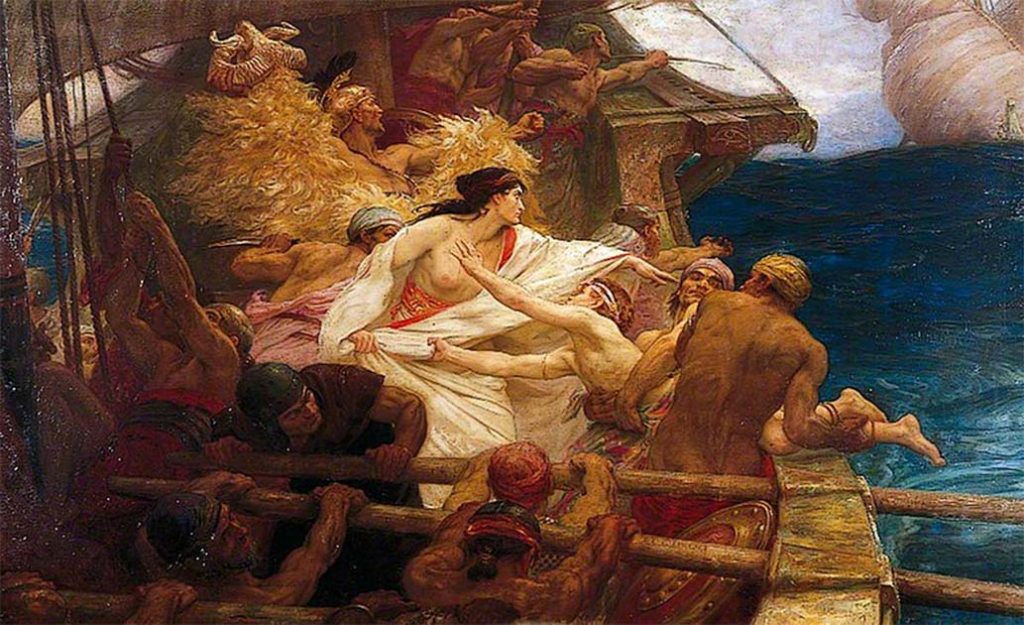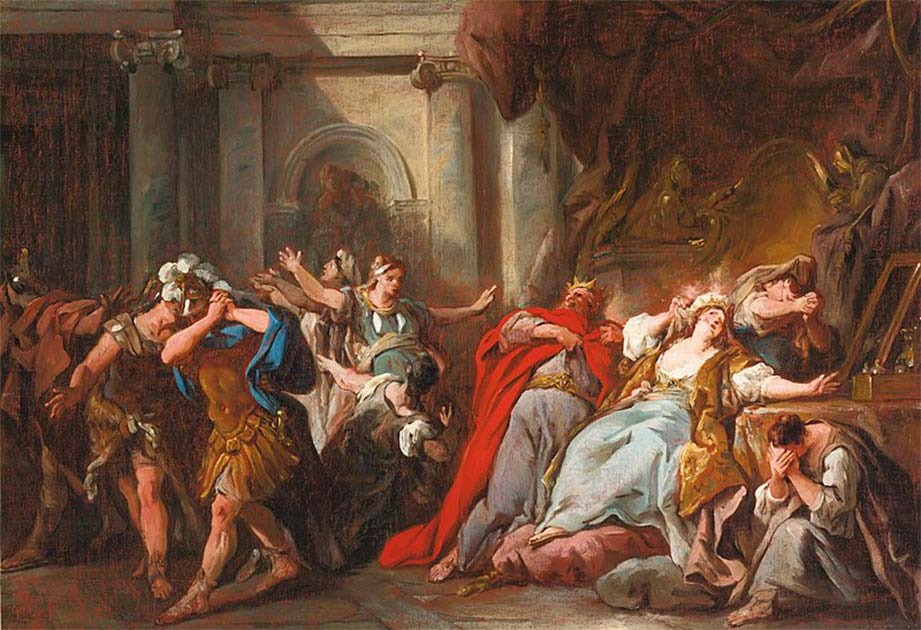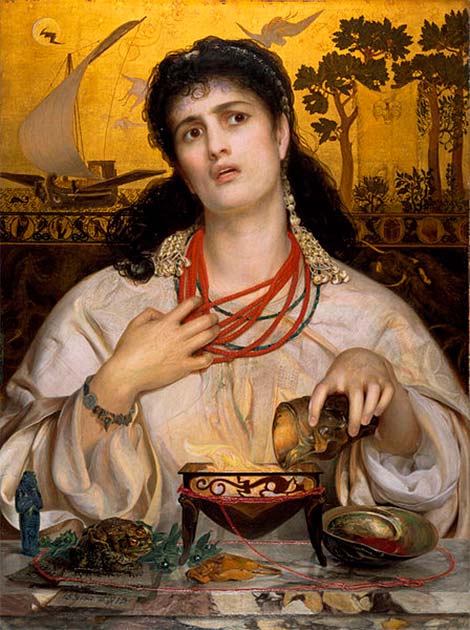The famous quote “Hell hath no fury like a woman scorned” is often used to describe the vengeful actions of a woman. While the phrase has been around since 1697 when William Congreve wrote the play The Mourning Bride, it summarizes the story of one woman from Greek Mythology: Medea.
Medea is a controversial figure due to her violent actions and her powerful desire for revenge, but this is also what fascinates. Medea was a sorceress, a mother, a murderer, a wife, and a lover scorned whose scorched-earth vengeance ruined the lives of everyone she loved, and herself.
Jason and Medea
Medea is a figure from Greek mythology who played a significant role in the myth of Jason and the Argonauts and is best known from the tragedy that shares her name, Medea by Euripides. Medea was the daughter of King Aeëtes of Colchis and had influential family members from the Greek pantheon.
Medea was the niece of the minor goddess and enchantress Circe and the granddaughter of the sun god Helios. Medea is known as a sorceress and is often depicted as a priestess of the goddess of witchcraft, Hecate.
In order to understand what set Medea on the path to her downfall and bloody revenge, we need to learn about her relationship with Jason. We first meet Medea during Jason’s quest for the Golden Fleece.

Hera, Athena, and Aphrodite decide to help Jason retrieve the Golden Fleece in order to prove his bona fides as a hero and claim his birthright. Hera was particularly invested in Jason’s success because she hated the man who had sent Jason on this quest: King Pelias.
If Jason were to bring the Fleece back to Pelias, Jason would take over the throne, and Pelias would no longer be king. Hera and Athena convinced either Aphrodite or Eros (one of the gods tasked with love, anyway) to put a spell on Medea so that she would fall in love with Jason and help him on his quest.
Jason knew Medea was a sorceress and gladly accepted her help. What Jason didn’t know was that Medea had been compelled by the gods to do so, and this is only the first example of her being used as an unwilling pawn in the stories of others.
Honestly though, she was more important in stealing the Golden Fleece than Jason. King Aeëtes demanded that in order to receive for Fleece, Jason had to complete several impossible challenges. The first challenge set by King Aeëtes was to “yoke a pair of fire-breathing oxen and control them while they plowed an entire field.”
Medea knew Jason would not survive the flaming breath of the oxen, so she made him an ointment that would make Jason impervious to fire. With the aid of the ointment, Jason completed this first task.
- Odysseus’s Oracle of the Dead: A Gateway to Hidden Knowledge?
- An Ancient Hero: Who was the Griffin Warrior of Pylos?
For the second task, Jason was ordered to take the teeth of a dragon and plant them in a sacred field. Medea warned him that once the teeth were planted, soldiers would erupt from the dirt, and the best way to survive the task was to throw a rock into the newly sprung soldiers to confuse them into attacking each other. Jason followed Medea’s advice, and the ruse worked.
Jason’s final task however was to steal the fleece from its guardian, a dragon that never slept. Medea knew that if Jason were to complete the final task and capture the Fleece, her father would know she helped him, so she begged Jason to help her escape, and in return, she would help him retrieve the Fleece.
In gratitude for the help he received, Jason promised to marry Medea and love her forever. Clearly here we are in the realm of classical tragedy: our hero is prepared to promise anything to succeed on his quest, and Medea has betrayed her family for love.
But we are only getting started. After Jason stole the Fleece from a sleepless dragon that Medea enchanted to sleep, King Aeëtes figured out what had happened and sent his soldiers to capture Medea to punish her. Medea’s brother Apsyrtus was the leader of the soldiers, and Jason and Medea planned to kill him so that they would not be stopped from escaping and eloping.

While she agreed to kill her brother, Medea hesitated, and Jason was the one to kill him. Jason then cut up Apsyrtus into pieces and scattered the pieces to delay King Aeëtes in trying to capture Jason and Medea because the king would want to collect all the remains of his son.
When Jason returned the Fleece to King Pelias, he refused to give Jason the throne, so Medea told Pelias’s daughters that she could create a potion to make their father youthful again. She told the girls that if they cut up their father and boiled them in a pot with “special herbs”.
To “prove” to the girls that the potion would work, she pretended to kill a sheep and then produced a live lamb, which convinced Pelias’ daughters to kill him. When Pelias didn’t come out of the pot alive and young, Jason and Medea had to flee Iolcus for the city of Corinth.
A Descent into Madness
In Corinth, Jason and Medea were together for ten years and had at least two and possibly as many as fourteen children (sources vary, as they do). After ten years, Jason began to resent Medea, and when the King of Corinth offered his daughter Glauce to Jason as a wife, Jason accepted.

If Jason married Glauce, he would regain the power and wealth, which he saw as his right but which he no longer had once the couple fled from Iolcus. When Medea finds out about Jason’s betrayal, she begins to go mad and seeks revenge on Jason for breaking her heart and his oath to love her forever.
Medea creates a poisonous dress and a small crown which she sends to Glauce as a wedding gift. The dress is beautiful, and when Glauce dons the dress and crown, she is killed by the poison (or, based on which version of the story you read, she was burnt alive). When The King of Corinth tries to save his daughter by removing the cursed items, he comes into contact with the poison, which promptly kills him too.
There are a few different versions of this myth, and in one version, Medea wants to hurt Jason further by ending his genetic line. So she kills her children even though she is devastated about the murders. She knows it will break Jason’s heart, so it is worth it in her mind.
- (Long Read) Queen Joanna of Castile: Madness or Mistreatment?
- Dictys of Crete: Was There a War Reporter at the Siege of Troy?
In Euripides’ tragedy, Medea knows that if Jason were to marry Glauce, she and her children would be sent away as exiles. Before Glauce is poisoned the King of Corinth puts pressure on Medea to leave the city.
So she chooses to murder her children in an act of mercy because she thought death was better than a life in exile or potential slavery. After Medea kills her children she refuses to let Jason see or hold his children’s bodies as yet another form of punishment for his betrayal.
After murdering several people Medea’s grandfather Helios brings her a chariot that is driven by dragons. With her children’s bodies in hand, Medea flys away from Corinth and headed to Athens and married a man named Aegeus and has a son with him.
Everything was going well for the new couple until Aegeus’s long-lost son Theseus returned. Medea is angered that Theseus will challenge her own son’s inheritance and decides to poison Theseus.
However when Theseus and Aegeus meet Aegeus recognizes Theseus’s sword as a gift he gave his long lost son and embrace in a hug which knocks a goblet of poison wine from Medea’s hands (Medea does a lot of poisoning), sparing Theseus’s life.

Medea then returns to her hometown of Colchis only to discover her uncle Peres had deposed her father as ruler of Colchis. In this version of the story Medea kills her uncle and restores the kingdom to her father.
In another version by the Greek historian Herodotus, Medea and her son named Medus fly away from Athens in her chariot. Medea landed in the Iranian plateau where she created a life living amongst the Aryans, who renamed themselves Medes in honor of Medea’s living son.
The Lesson of the Myth
The myth of Medea is incredibly complex and covers many themes. In Euripides’s tragedy the themes of passion, rage, pride, hubris, justice, and intelligence. Medea is hot headed and lets her emotions overcome her, she was willing to kill her own brother if it meant she and Jason could elope.
She is willing to hurt herself just to make Jason’s life miserable, by killing her own children. What often gets forgotten in this myth is that Medea was under the love spell that either Aphrodite or Eros cast upon her back when Jason was seeking the Golden Fleece.
She fell madly in love with him, betrayed her father and agreed to kill her brother for Jason. When Jason agreed to marry Glauce it was for political and financial advancement. He wanted to marry Glauce and keep Medea, the mother of his children, as the “side woman”.
He promised his love to her and after ten years threw it away for someone else. Can you blame Medea for wanting to hurt Jason? The main lesson from Medea is that emotions can make people do crazy and irrational things. When emotions run wild, insanity can take over and cloud your vision and result in drastic actions.
Top Image: Medea escapes in her chariot with her dead children. Source: Germán Hernández Amores / Public Domain.